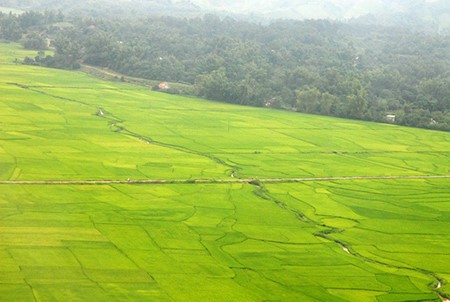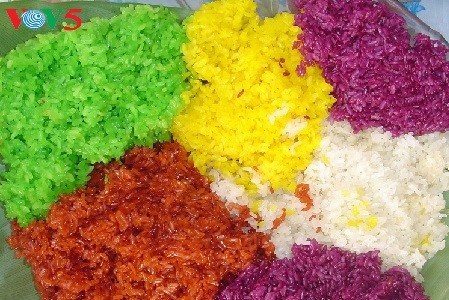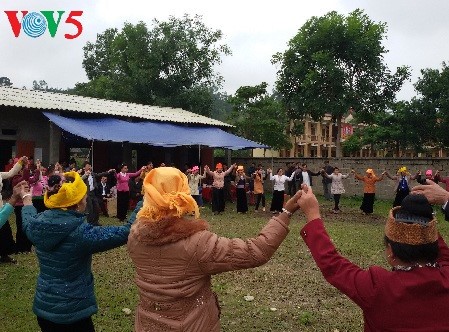(VOVworld)- Muong Lo valley in Nghia Lo township, Yen Bai province is famous for delicious rice thanks to its fertile soil. Nestled in mountains, the flat valley is the habitat of several ethnic minorities with diverse cultures and customs.

Muong Lo rice field- Photo: internet |
Located 80 km from Yen Bai city, Muong Lo is the northern region’s second largest rice field after Muong Thanh field in Dien Bien province. Viewed from above, Muong Lo looks like a yellow saucepan surrounded by winding Nam Thia stream and cloud-covered mountains. Muong Lo is home to 17 ethnic minority groups with the Black Thai accounting for the largest number because they have lived there for the longest time. Ha Thi Thu, a local Thai woman, says: “Muong Lo field is 3,000 ha. We grow two rice crops a year. Thanks to favorable weather, people’s living conditions have improved. In recent years, we have received an increasing number of tourists, especially in the ripening rice season.”

Five-colored sticky rice of the Thai - Photo: Dinh Tuan (VOV) |
The Black Thai in Muong Lo still retain their traditional cuisine. A very popular dish is fish sticky rice, known as “Pa Mok”, which is made of fried local fish, banana flowers, ginger, garlic, herbs and sticky rice. But the favorite dish of the Black Thai is five-colored sticky rice which is made of sticky rice colored using local plants. A plate of five-colored stick rice is often shaped like an orchid flower because according to the local people, orchids represent the northwestern region. The five colors represent the five elements. Artisan Dieu Thi Sieng says: "Red represents aspiration, purple represents the fertile soil, yellow is for wealth, green is the color of the northwestern region and white is the color of pure love. Making this type of sticky rice, the Thai hope for wealth and happiness.”

Visitors to Muong Lo are summoned to a Xoe dance performance by the sound of flutes and gongs- Photo: Dinh Tuan |
Visitors to Muong Lo are summoned to a Xoe dance performance by the sound of flutes and gongs. Xoe dancing represents the desire for love, peace, wealth, and happiness. Thai artist Lo Van Bien says Xoe dancing is an integral part of Thai festivals and parties: “Xoe dancing brings people closer to each other. It represents equality. Xoe dancing is performed in parties, ceremonies, and festivals – for instance, wedding parties or house warming ceremonies.”
Cau Mua or “Praying for a bumper crop” is the most popular festival of the Thai. The festival features Xoe and Chom Chieng dances and performances of flute and gong as well as local dishes and wine. With its beautiful rice fields, many scenic spots, and diverse culture and tradition, Muong Lo attracts a lot of visitors.